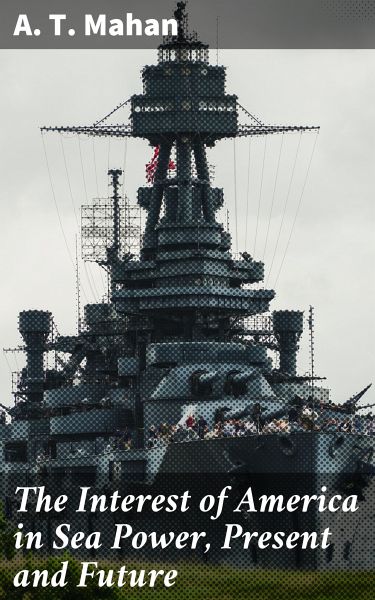
The Interest of America in Sea Power, Present and Future (eBook, ePUB)
Enriched edition. Unlocking America's Naval Strength: Insights on Maritime Strategy and Global Influence
Kommentar: Shepherd, Brooke / Redaktion: Good Press

PAYBACK Punkte
0 °P sammeln!
In "The Interest of America in Sea Power, Present and Future," A. T. Mahan articulates a compelling argument for the strategic importance of naval power in American foreign policy and national security. Drawing on historical context, Mahan employs a persuasive, analytical style that intertwines empirical data with vivid narratives of naval warfare and maritime commerce. Published at a time when the United States was grappling with its identity as a burgeoning global power at the turn of the 20th century, this work underscores the necessity of a formidable navy as a key to safeguarding national...
In "The Interest of America in Sea Power, Present and Future," A. T. Mahan articulates a compelling argument for the strategic importance of naval power in American foreign policy and national security. Drawing on historical context, Mahan employs a persuasive, analytical style that intertwines empirical data with vivid narratives of naval warfare and maritime commerce. Published at a time when the United States was grappling with its identity as a burgeoning global power at the turn of the 20th century, this work underscores the necessity of a formidable navy as a key to safeguarding national interests and projecting influence abroad. Mahan, a naval officer and historian, was significantly influenced by the geopolitics of his era, particularly the expansionist policies of the United States and the imperial ambitions of European powers. His experiences in the Navy and his keen observations of world affairs informed his belief in the vital connection between sea power and national prosperity. Mahan's theories would later inspire naval strategists and policymakers, shaping maritime doctrine for generations. For readers interested in military history, international relations, or the evolution of American diplomacy, Mahan's insightful analysis offers timeless lessons on the interplay between naval strength and global influence. This seminal work stands as a vital examination of sea power that remains relevant in contemporary discussions on national security. In this enriched edition, we have carefully created added value for your reading experience: - A succinct Introduction situates the work's timeless appeal and themes. - The Synopsis outlines the central plot, highlighting key developments without spoiling critical twists. - A detailed Historical Context immerses you in the era's events and influences that shaped the writing. - An Author Biography reveals milestones in the author's life, illuminating the personal insights behind the text. - A thorough Analysis dissects symbols, motifs, and character arcs to unearth underlying meanings. - Reflection questions prompt you to engage personally with the work's messages, connecting them to modern life. - Hand-picked Memorable Quotes shine a spotlight on moments of literary brilliance. - Interactive footnotes clarify unusual references, historical allusions, and archaic phrases for an effortless, more informed read.
Dieser Download kann aus rechtlichen Gründen nur mit Rechnungsadresse in A, B, BG, CY, CZ, D, DK, EW, E, FIN, F, GR, H, IRL, I, LT, L, LR, M, NL, PL, P, R, S, SLO, SK ausgeliefert werden.













